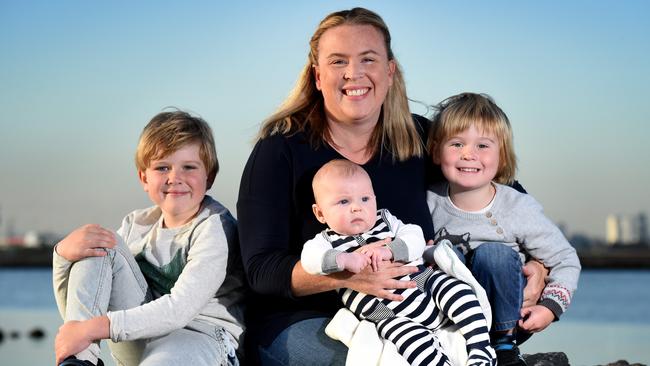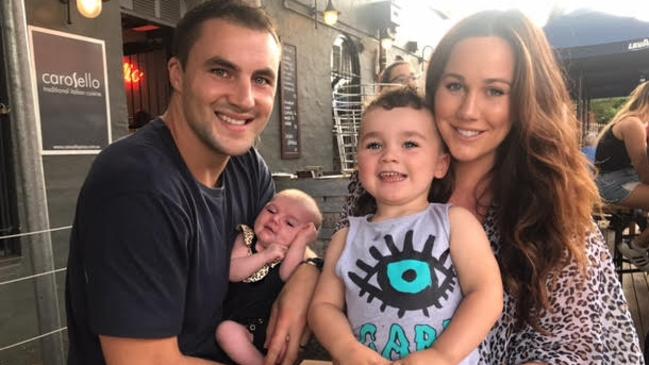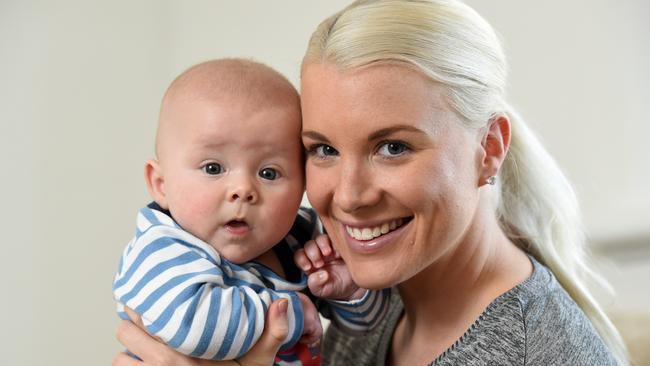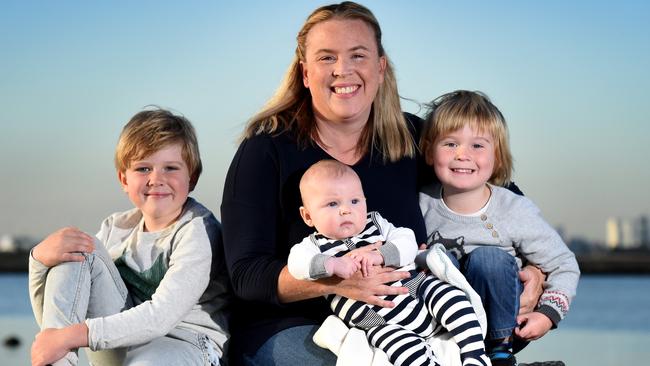Public or private childbirth. What are the pros and cons?
For those expecting a baby, it’s the big question — public or private? We speak to mums who have tried both — or are planning to — about their labour ward experiences.

VIC News
Don't miss out on the headlines from VIC News. Followed categories will be added to My News.
To say Sophie Cachia was hesitant before delivering her daughter in January is an understatement.
The popular blogger, known as The Young Mummy, had her first child, son Bobby, in the private Frances Perry House three years ago and can’t speak more highly of the experience.
At the time, she was still covered by her parents’ private health insurance, affording her the experience of having constant contact with one obstetrician, a five-night stay in hospital and access to facilities such as a breastfeeding room with specialised help.
But by the time she became pregnant with little Florence last year, things had changed.
Cachia was no longer covered by private health insurance and, after a stint in Adelaide, she returned to Melbourne at about 15 weeks pregnant and was faced with using the public hospital system.
“I was really, really worried about it because I had heard horrible things,” says the wife of former Carlton footballer Jaryd Cachia.
She had nightmares about having to share a room with four women, worried that someone she’d never met before was going to deliver her baby and felt anxious about the reduced number of medical appointments.
Having now come out the other side, Cachia is a convert and strident advocate.

“I loved the (Royal) Womens’ Hospital, they were amazing,” she says. “The midwives were really personable, they really cared about me and what was going on.”
Cachia says that as a first-time mum with Bobby, her experience in a private hospital was comforting.
But she has no hesitation in recommending the public system, saying she would even return for a third child.
“One hundred per cent, have faith in the public system. At the end of the day, they’re all trained in the same field,” she says. “I just can’t fault it.”
When Florence’s heart rate skyrocketed, six or seven doctors were in the room to confer on the situation. Cachia was lucky to have a large room on her own and left the hospital 13 hours after the birth feeling calm and confident, with midwives visiting her at home three times over the next week.
And it all came without the $7000-$8000 price tag she faced when she had Bobby at 23.
Medibank Private recently revealed it had a huge increase in benefits paid to members, with the average hospital claim for child birth in 2016 at $9421.
Alicia McPherson had always believed private health insurance was something worth investing in — and when she unexpectedly fell pregnant with her second child and was forced to use the public system, she appreciated why.
McPherson comes from a family of health professionals who instilled in her a strong belief that private health insurance is essential at every stage of life. She gave birth to her first baby in the private system, and is very much of the feeling it was money well spent. She researched and chose her obstetrician and after the birth, recovered at a luxury hotel.

“The downfall with private is that you have to pay extra for everything: anaesthetists, paediatricians,” says McPherson, of South Kingsville. “It came to a few thousand.”
After the birth of her baby and on a tighter budget, due to being off work, McPherson and her husband dropped pregnancy and birth from their insurance policy — and promptly fell pregnant.
“I started freaking out because we didn’t have cover,” she says. “But then my GP told me that she had her child in the public system and that it was just as good. ‘Well,’ I thought, ‘if a doctor says that …’ ”
McPherson says everything about the experience of the public system was “harder”. In particular, not having control over knowing who would be the obstetrician delivering her baby left her feeling anxious, especially given she knew she was having a caesarean.
“I was sharing this dark, dingy room with a mother who was depressed and a baby that screamed the entire time,” she says. “I have so much sympathy for that mother, but she couldn’t stand the sunlight so the curtains had to be closed the whole time, and the baby just cried and cried.”
McPherson was upset at being away from her first child for the first time, especially given he was so young, and the stress of her situation compounded her misery.
“I just kept thinking, if I were in a private room, my mum could have brought him in and he could have played and spent time with us.”
For many Australian parents-to-be, choosing the public system for their pregnancy and birth is becoming increasingly attractive, with the high standard of public care and cost of insurance commonly cited reason.

So is dropping private cover for obstetrics, or not taking it up at all, such a bad idea? Especially considering that, according to privatehealth.gov.au, a product covering pregnancy can range from just under $200 to $400 a month?
“Anecdotally, I would agree that more parents are considering going public,” National Association of Specialist Obstetricians and Gynaecologists president Dr Gary Swift says.
“But it isn’t because the public system has suddenly become great.
“There are people who will always go public, and those who will always go private, but there is a group in the middle who will be susceptible to dropping private cover because of economic factors. When there are a lot of competing expenses, private insurance for things like pregnancy can be one of the first to go.”
Medibank’s chief medical officer Dr Linda Swan says stories such as McPherson’s are becoming more common. Rather than dropping their cover completely, she says, people are instead “stripping it down” of things they don’t believe they need.
“The problem with that is that people don’t stop and reassess their needs at different stages of their lives,” Swan says.
“And what happens is that they are caught with not enough, or not the right cover.”
Sara Petrie had her first child in a public hospital and was so distressed she will switch to private for her second.
Petrie and her husband’s plans to conceive happened more quickly than expected and they were left without pregnancy on their health cover. At first she didn’t mind so much. She was a shared care patient so was able to see her own GP for much of her pregnancy.
It was when labour started that the pain did also.

Petrie had asked for the blood work to be done for an epidural and requested sterile water injections, both for pain management.
“They just never happened. I don’t blame the midwives — they were clearly run off their feet.”
Things went from bad to worse for Petrie. Her baby didn’t take to the breast and when he started becoming dehydrated, was put on formula. Unable to nurse her new baby, Petrie’s self-esteem plummeted.
She wanted to see a lactation consultant but there was only one available in the maternity ward,
so her time was limited. Her distress was compounded by lack of sleep.
“I shared a room with two women who had large families who visited all the time — there was constantly 10 or 12 family members in the room,” she says.
Then she was told to go home. Petrie was presented with discharge paperwork stating her baby was breastfeeding well, despite the fact he never had.
“They wanted to send me home with a baby who wasn’t feeding,” she says.
“In private hospitals there are breastfeeding lounges with midwives always available.”
Swift says the public system does work well for those with appropriate expectations.
“For people who have uncomplicated pregnancies or who don’t mind being seen by several different midwives and doctors, public is great,” he says. “Some people are natural mums and need little help.
“They go in, have their babies and go home, with no out-of-pocket expense.
“Private is better for those who want to choose their own doctor, or want to spend a few extra days in hospital adjusting to having a baby.
“You know your doctor and you know they are on hand if needed.”
A single point of contact was key for Williamstown’s Jemima Bowen. Bowen had her third baby in the public system, using a private obstetrician.
Bowen says she didn’t have time to wait for hours in a public hospital for every check-up.
Having had trouble falling pregnant, she also liked the peace of mind that came with knowing her doctor knew everything about her pregnancy.
“We knew that there would be out-of-pocket expenses, but it was at a time that mothers received a baby bonus from the government, so we allocated those funds for the expenses.”

After having her first two children privately, Bowen appreciated being able to use the same obstetrician in the public system for her third.
“She was an amazing doctor. I had a bad reaction to the anaesthetic with my first, and she knew this and she knew exactly what I needed.”
Bowen agrees the public system deals with a lot of women on a limited budget and says she feels good about not being an extra pull on those resources.
“We are not really wealthy, but we could afford a private obstetrician. I felt like we could, so we should.”
For many, it’s not just the insurance premium; it’s all the extra expenses — “the gap” between the cost of a private service and what Medicare and private health insurance covers.
“People complain about the gap and having to pay extra in addition to insurance premiums, but if you have car insurance and you have an accident you have to pay an excess. It’s the same thing,” Swift says.
Like any financial decision, Swift urges people to shop around for insurance.

“There are variations in fee structures, depending on doctor and location and what you actually want covered. It is also important these days to be very careful with respect to health insurance policies for inclusions, exclusions and excesses.”
For Tennille Balaz, of Seddon, private cover was money well spent. Continuity of care was a major factor in Balaz’s decision to switch from the public system she used for the birth of her first child, to the private system for her second.
“The midwives were great,” Balaz says. “The problem was there was no continuity of care.”
Balaz was nervous about her first pregnancy, particularly as her baby was large.
“I had these fears about having a big baby. But I felt the doctors and midwives weren’t interested. At the time I was thinking, ‘Maybe if I had the one doctor they would know me and know my fears’.”
Balaz’s baby was born with a fever and mother and child spent five days in hospital, during which time they saw several different midwives.
“We chose private for our second son. We are happy to pay the money to know I have five days of care, that I have the one doctor the whole time, and that afterwards I have a person I can contact or call if I need to.”
This one-on-one care, says Swift, is a key reason people choose private.
“You have the one doctor who has the whole responsibility, and that’s comforting,” he says. “The public sector does mean that students are involved in care and trainee doctors, nurses and midwives.”
Having experienced both sectors and having loved her experience in a public hospital, Sydneysider Tanith Carroll says time has provided her with a bit of perspective.
“Looking back, the decision seemed so important and all-encompassing,” Carroll says. “But it’s a short period of time with your child. You leave the hospital with your baby, and then it’s time to put it all in the past and watch them grow.”


